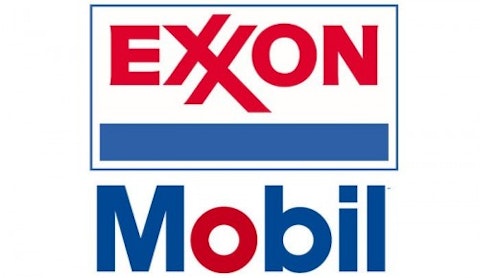Exxon Mobil Corporation (NYSE:XOM) claims that it is committed to “having a workplace that is free from any form of harassment or discrimination” so it can foster an environment that empowers all employees to perform optimally. But, in fact, Exxon’s policies put it at a competitive disadvantage against rivals that can better attract employees from traditionally marginalized groups.
But do its current policies do a good job of achieving these goals? I think not. And nearly 20% of Exxon Mobil Corporation (NYSE:XOM)‘s shareholders agree with me. Here’s why I think they’re right.
Shareholder challenge
In a proposal in Exxon Mobil Corporation (NYSE:XOM)‘s 2013 proxy statement, the New York State Common Retirement Fund calls on the company to “amend its written equal employment opportunity policy to explicitly prohibit discrimination based on sexual orientation and gender identity.”
In fact, 2013 was the 14th year in a row that shareholders pushed for such changes.
Exxon Mobil Corporation (NYSE:XOM)‘s board asked shareholders to reject the proposal. In its response, the board stated that the company’s policies as a whole make it clear that “no form of discrimination or harassment in the workplace will be tolerated.” Thus, they claim there is no need for the “Harassment in the Workplace” policies to explicitly state that LGBT (lesbian, gay, bisexual, transgendered) individuals are protected under Exxon Mobil Corporation (NYSE:XOM)‘s policies.
Here’s why I think they are wrong.
Insufficient protections
In its shareholder proposal, the New York State Common Retirement Fund argues that “corporations that prohibit discrimination on the basis of sexual orientation and gender identity have a competitive advantage in recruiting and retaining employees from the widest talent pool.”
I believe they’re right. Companies that protect LGBT employees from discrimination arguably have a greater ability to recruit highly qualified individuals belonging to these groups, and to foster an environment where they can work as productively as possible.
Thus, a failure to protect these employees arguably puts Exxon at a competitive disadvantage against companies like Chevron Corporation (NYSE:CVX), Royal Dutch Shell plc (ADR) (NYSE:RDS.A), and BP plc (ADR) (NYSE:BP) which, according to the Human Rights Campaign, all offer better protections and benefits for LGBT employees.
To genuinely protect individuals that are particularly vulnerable to discrimination, I believe companies need to adopt company-wide policies that make it clear they are protected. In fact, there is some suggestion that Exxon already understands this, as its “Harassment in the Workplace” policy explicitly prohibits “harassment based on race, color, sex, religion, national origin, citizenship status, age, genetic information, physical or mental disability, veteran or other protected status.”
The absence of explicit protections for LGBT individuals is notable here, given that such individuals are particularly vulnerable to discrimination. As pointed out by the shareholder proposal, a 2009 survey finds that “44% of gay and lesbian workers in the United States reported an experience with some form of job discrimination related to sexual orientation.” Also, “an earlier survey found that almost one out of every 10 gay or lesbian adults also stated that they had been fired or dismissed unfairly from a previous job, or pressured to quit a job because of their sexual orientation.”
Also, I believe that other policies at Exxon foster a culture that represents LGBT individuals as second-class citizens. For example, the company refuses to offer extended benefits to same-sex couples unless they are required by law to do so. In fact, when Exxon acquired Mobil in 1999 and XTO Energy in 2009, it eliminated the LGBT protections and benefits offered by those companies.
If these moves don’t send a message that Exxon has little interest in preventing discrimination against LGBT employees, I don’t know what does.
The Foolish takeaway
For these reasons, I believe shareholders have a financial incentive to continue pushing for better LGBT protections at Exxon. I also think investors thinking about purchasing the stock should consider how Exxon’s failure to make these changes may affect its long-term ability to compete effectively with industry peers.
The article Exxon’s Employment Policies Are Bad for Business originally appeared on Fool.com and is written by M. Joy Hayes, Joy.
Motley Fool contributor M. Joy Hayes, Ph.D. is the principal at ethics consulting firm Courageous Ethics. She has no positions in any of the stocks mentioned. Follow @JoyofEthics on Twitter. The Motley Fool recommends Chevron.
Copyright © 1995 – 2013 The Motley Fool, LLC. All rights reserved. The Motley Fool has a disclosure policy.




